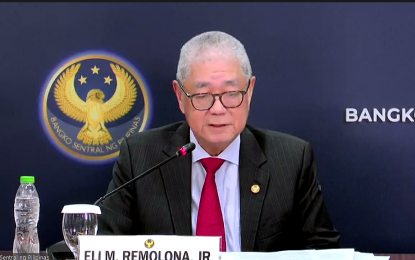
UNCHANGED. Bangko Sentral ng Pilipinas Governor Eli Remolona Jr. says the central bank's Monetary Board kept key policy rates unchanged on Thursday (Aug. 17, 2023). The decision was based on expectations that headline inflation will continue to go down. (Screenshot from BSP's briefing)
MANILA --The Bangko Sentral ng Pilipinas' policy-making Monetary Board (MB) kept for the third rate-setting meeting the BSP's key rates on the back of the projected continued slowdown of domestic inflation.
With the latest decision, the BSP's overnight reverse repurchase facility remained at 6.25 percent, overnight deposit rate at 5.75 percent, and overnight lending rate at 6.75 percent.
"Latest baseline projections continue to show a return to inflation target in the fourth quarter of 2023 despite a generally higher path for inflation relative to the previous forecast from the monetary policy meeting in June, reflecting mainly the impact of higher international oil prices," BSP Governor Eli Remolona Jr. said in a briefing on Thursday.
Headline inflation further slowed to a 16-month low of 4.7 percent in July.
The average inflation rate for this year was slightly adjusted upward to 5.6 percent from the previous 5.5 percent estimate.
The average inflation forecast for 2024 was also adjusted to 3.3 percent from the earlier 2.8 percent estimate while the 2025 projection was at 3.4 percent.
The adjustments were made to take into account supply side pressures.
Remolona said the balance of risks to the inflation forecast continued to lean toward the upside.
"Potential price pressures are linked to the impact of possible higher transport charges, higher minimum wage adjustments, persistent supply constraints on key food items, and the effects of El Niño weather conditions on food prices and power rates," he said.
He said a weaker-than-expected global economic recovery remained as the primary downside risk to the inflation outlook.
Remolona noted that the MB recognizes the challenging outlook for economic growth, adding that the weaker gross domestic product (GDP) expansion in the second quarter of the year "reflected a broad-based slowdown in domestic demand."
Philippine economic growth slowed to 4.3 percent in the second quarter of the year which Remolona attributed to the contraction in government spending and the slowdown in household consumption due to elevated commodity prices.
"Given these considerations, the Monetary Board deemed it appropriate to maintain monetary policy settings to allow a moderation of inflation even as authorities continue to assess the emerging risks to the inflation outlook," he said.
"Authorities noted that the strength of economic activity going forward is likely to moderate as pent-up demand wanes and the full impact of prior monetary policy tightening continues to manifest. At the same time, fiscal impulse through programmed spending could support the growth momentum," he added.
Remolona said sustained non-monetary measures remained crucial in addressing lingering supply-side pressures on prices.
"The BSP remains prepared to respond as necessary to safeguard the inflation target, in keeping with its primary mandate to ensure price stability," he said. (PNA)
